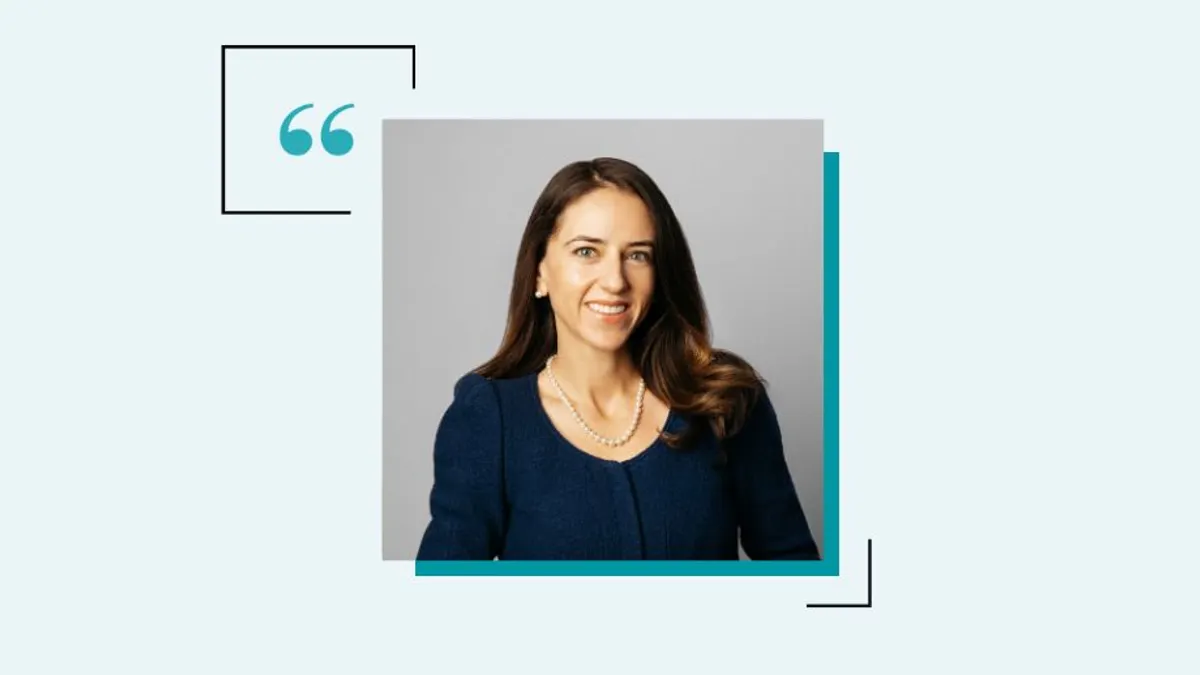Life experience combined with a wealth of knowledge and a desire to learn always tends to be great stepping stones to the sound development of leadership skills. As a graduate of Harvard and Columbia Universities amid a 15-year career in financial services and technology, Kate Peachway of TS Imagine, a capital markets and investment management software company, has been extremely busy over the past few months. The first-time CFO is also a professor at her alma mater Columbia and a mother of three children.
As her American life began at four years old after immigrating from Lviv, Ukraine, Peachway has found ways to use her corporate finance knowledge and experience to help those with a similar story. She serves on the advisory board of Kids of Ukraine, a non-profit organization that helps children and their mothers living in Ukraine.
Peachway, now nearly a year into her inaugural CFO position, is taking her experience — worked, earned, and learned — and applying it in her leadership role.
 Kate Peachway
Kate Peachway
CFO, TS Imagine
- First CFO position: 2022
- Notable previous companies:
- GrowthCurve Capital
- BlueMountain Capital Management
- Morgan Stanley
This interview has been edited for brevity and clarity.
ADAM ZAKI: In your first year as a CFO, how has it been? What has been expected and unexpected, and what have you enjoyed the most?
PEACHWAY: The benefits of private equity ownership, one of the key reasons I joined the company, were on display. At the board level, Francisco Partners' investment team was nimble and responsive in allocating capital toward our key strategic priorities.
What was unexpected was the rapid pace of adoption of our fixed-income trading software. One of the biggest themes in fintech is the electronification of fixed-income asset classes, and our software is very much at the center of the generational shift that is playing out. When I joined, our offering was more nascent, but over a year, the pace at which we have grown our client base and team has been a pleasant surprise.
What I have enjoyed the most is the people. Our global offices span New York to Montreal, Paris to London, Zurich to Ukraine, and Hong Kong to Singapore. Each office has its own team culture, but there is collective buy-in about the company-wide mission.
You have a super-interesting background. What have you accomplished in your career that you credit to the development of your skills that make you successful?
PEACHWAY: I’m trained as an investor. I worked at Morgan Stanley investment banking in mergers and acquisitions and then as a buy-side investor across public and private markets. Investors and CFOs have a critical thing in common: they are professional capital allocators. Capital allocation is the mechanism of value creation.
A background in investing is great training because you build up a library of how businesses succeed and fail. You also live and breathe financial analysis, accounting, and valuation. The traditional view that the CEO sets the company’s strategy and the CFO counts numbers is outdated, in my opinion. Today, CFOs need an investor mindset because strategy and financial evaluation are linked.
An investor-minded CFO slices and dices the financials and uses the numbers as tools to drive strategic priorities and business insights.
Everything I learned about leadership has come from my immigrant background. I immigrated to the United States from Ukraine. Imagine someone who comes to a new country at four years old, doesn’t speak the language, and takes an hour-long subway to get to school. I learned how to get along with many types of people from a young age. Today, I try to put myself in the shoes of my colleagues and bring a high degree of empathy to work.
Is there anything specific from your previous work in private equity that has helped you as a CFO?
PEACHWAY: Private equity investors take an active, operational approach. Having patient, long-duration capital allows management teams to execute these transformations. The thesis here at TS Imagine is that we merged two founder-owned and founder-led companies, providing a strong foundation to accelerate the business.
Investors use analysis to uncover business trends. An investor-minded CFO slices and dices the financials and uses the numbers as tools to drive strategic priorities and business insights. Clarity of financials leads to clarity of thought which leads to leads to clarity of action.
Investors bring a forensic approach to the numbers by digging into accounting, financial health, and management teams. That investor experience was invaluable because the CFO’s job is not only to assess opportunities but also to protect the business from risks and challenges.
You're also a professor at Columbia. What is the value of higher education within corporate finance and other industries? Why do you feel like teaching is worth your time?
PEACHWAY: In his book “Outliers,” Malcolm Gladwell popularized the concept of 10,000 hours of deliberate practice to attain mastery in a field. While there are many ways to go about this process, an MBA is certainly one way to immerse yourself in many facets of business.
We also operate in a global, interconnected business world, and an MBA is an opportunity to widen your horizons and network. I met some of the most interesting people I know at business school.
Columbia Business School has a unique offering, which is the value-investing curriculum. This curriculum was incredibly valuable to me as an MBA student, and I feel I am returning the favor.
Why do you think CFOs tell me that the value of an MBA is decreasing? Do you agree?
PEACHWAY: I think that an MBA is what you make of it. Charlie Munger has a quote that successful people are learning machines. "They go to bed every night a little wiser than they were when they got up. You can progress only when you learn the method of learning. Nothing has served me better in my long life than continuous learning.”
An MBA is an opportunity to widen your horizons and network. I met some of the most interesting people I know at business school.
What are your top two goals for the rest of 2023, and how do you plan on executing them?
PEACHWAY: Following the bank failures in March, we have seen a surge in demand for our real-time risk management software, RiskSmart X. Recent market swings have revealed the limitations of legacy risk technology, and both the sell-side and buy-side are searching for better solutions. My goal is to ensure that our risk management technology teams have the financial and operational support they require to accommodate the influx of new opportunities.
My second goal holds personal significance for me as a former hedge fund analyst. We have seen heightened demand from traders and portfolio managers for higher-performance solutions. The predominant tech stack for investment firms is siloed, stitched together, and often frustrating for the user. In May, we are launching a bundled, cross-asset-class SaaS solution called TS One. TS One was developed specifically for hedge funds, so it is a lot of fun to see how we can drive innovation in my former industry.













